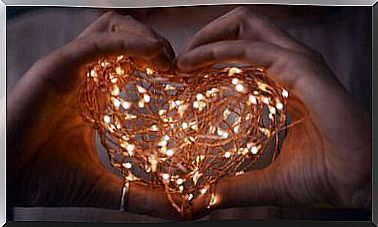The Body Language Of The Feeling Of Inferiority

We do not need to resort to words to express ourselves. All the time we are talking with our gestures, with our postures and with the expressions of the face. A good example of this is the body language of the feeling of inferiority. Although we try to hide it, there are many ways of saying with our body that we have a poor concept of ourselves.
The body language of the feeling of inferiority has an important social impact. We are all trained to interpret the messages of the body, even if we have not read anything about it. However, this interpretation occurs in the unconscious plane but, even so, it determines to a large extent the way of seeing others and of relating to them.
In other words, the body language of the feeling of inferiority makes others perceive you as a person who does not like themselves. The effect of this is that behaviors that correspond to that impoverished image that you project will be activated . They will also perceive you as inferior and act accordingly.
But what is that language of those who feel inferior like? Next, a brief inventory of the gestures that represent him will be made.

Shrugging and the body language of the feeling of inferiority
Instinctively, all animals tend to try to get smaller or bigger when they feel they are at a disadvantage compared to another. The most common is that they shrink and look for a way to make themselves small, so as not to be seen. However, the peacock, for example, spreads its plumage to look bigger when it feels that it is in front of something that threatens it.
We humans do something similar. That shrinkage is seen in us more as a crush, that is, an attempt to become similar to a shell closed on itself. This is a typical gesture in the body language of the feeling of inferiority.
It manifests itself, above all, as stooping. The body leans over itself, when walking or sitting. The tilt is visible, although it is only manifested in the head. In fact, the famous bowing gesture is a conscious way of bowing in front of someone who is seen as superior.
The crossover
Together with the gesture of shrinking and as a reinforcement of this, it is also usual for those who feel inferior to look for a way to create shields to isolate or protect their body. It is a way in which a defensive attitude, self-protection and delimitation of the territory is expressed. It supposes a strong feeling of inferiority.
The usual thing is that the arms and legs are crossed. The crossing of the arms at the chest level puts a defensive barrier, in front of the other. The crossing of the legs, especially when it is a convoluted gesture, fulfills the function of becoming smaller and closing in on itself. It clearly denotes the intention to protect oneself from something or someone that is assumed to be more powerful.
Small movements
When what prevails is a feeling of inferiority, the person feels as if he should sneak around the world ; that is, try not to attract attention, go unnoticed and “do not disturb” anyone with your presence. A person who feels inadequate often assumes that they are uncomfortable just being there. In short, try not to be present because being seen or heard creates feelings of shame.
From the point of view of the body language of the feeling of inferiority, all this manifests itself as an insistent tendency to perform short movements. They walk with short steps, make small movements with their hands, say short sentences. All this serves the function of reducing the effect of its presence.

The gestures of empowerment
The psychologist Amy Cuddy, author of the book Body language shapes our identity , ensures that science has detected a very interesting phenomenon. This consists in the fact that the position we adopt has a marked influence on what we feel and think, as well as the reverse. So if we adopt the body language of inferiority, the more inferior we feel.
Cuddy proposes to do the opposite. He says that in a moment of insecurity or lack of confidence in ourselves, what we must do is adopt powerful body language. According to his approach, two minutes of doing this are enough for the ideas that go through our heads to begin to change.
In this way, in times of stress or fear it is a good idea to change the posture of our body. Cuddy advises standing up and leaning on a table with your fingertips, with your head upright and your back straight. According to her, this increases testosterone and with it comes a sense of empowerment.









